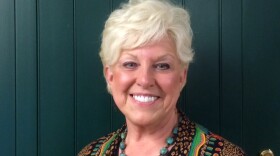A bill to overhaul training standards for cosmetologists was lying dormant until it suddenly gained momentum this month, passing out of an Ohio House committee. Now opponents are scrambling to fight the bill, saying it waters down the license. But supporters argue the bill is needed to help the state’s salon industry thrive. Ohio Public Radio's Andy Chow reports.
“So if I don’t want the bleach to touch this I’m gonna use the foil to block it.”
Katie Groezinger is meticulous, as she lays one narrow strip of foil after another onto her client’s hair. She’s standing next to her salon chair at The Spa School in Worthington. Groezinger, a cosmetology student, then grabs a small brush and begins to add another layer of color to a different strip of hair.
“We’re making her regrowth a little darker.”
Groezinger is 300 hours away from earning an advanced cosmetology license, an advanced license that would be eliminated if a bill that’s sitting in the Ohio House were to pass.
“I will put our 1,500 and 1,800-hour education up against anybody in the United States, we teach complete cosmetology.”
That’s Sue Carter Moore, president emeritus of the Salon Schools Group, which provides training for cosmetologists. She’s adamantly against the bill that would cut the number of hours needed for a basic license to 1,000 hours.
The proposed change to cosmetology standards in Ohio is comprehensive. Along with reducing instruction hours and getting rid of the advanced cosmetology license, it eliminates the natural hairstyling license and other advanced licenses dealing with nail and skin care.
Because the bill deals with so much, there are several voices sounding off for and against the measure. But perhaps the most heated debate is between two groups; Carter Moore and her association of private cosmetology schools versus salons.
Elizabeth Murch represents the Ohio Salon Association, which firmly supports the bill. She says these changes are crucial to keep up with a growing need for cosmetologists.
“The main crisis isn’t moving to 1,000 hours the main crisis is that schools are closing; the Dayton area has been hit significantly with school closures which then provides difficulty for any salon to find qualified individuals to work.”
She says this is the standard that’s already in place for anyone getting a cosmetology license from a public vocational and career tech schools. Murch argues that 1,000 hours is an adequate amount of time to teach students about safety and sanitation measures, which she says are the only thing the state should be regulating.
“The standard cannot be unfair and we should be legislating safety and sanitary practices entering this profession. We cannot legislate a good haircut.”
“I’m personally offended.”
Carter Moore with the Salon Schools Group says that’s dramatically underselling the value of a cosmetology education.
“This business is constantly evolving with new products new techniques and new chemicals that we’re working with.”
As Murch points out, EMTs, police officers, and nurses are all required to participate in significantly less instruction.
She adds that people can get extra education on the salon floor as employees rather than students at expensive private schools that can take a long time to pay off. a
“Where the students are providing services not being paid but they are providing services and the school is making money.”
But Carter Moore says students get real first-hand experience at a school rather than being relegated to assistants in a salon. She adds that the advanced licenses give students the confidence to go straight to starting their own business without signing contracts with salons. So, as Carter Moore puts it, this bill can help salons reduce competition.
Murch says there’s nothing stopping the cosmetology schools from still teaching a 1,500-hour course. Carter Moore says they can do that but students will still only walk away with a state license that says they completed 1,000 hours of instruction.
Back at The Spa School, Groezinger doesn’t regret the 1500 hours of instruction she’s received, saying it’s a craft that needs to be honed.
“I don’t think 1,000 hours is enough for anyone to be professional at what they’re doing.”
The bill has passed a House committee and now awaits a vote in the full House chamber before moving to the Senate.





